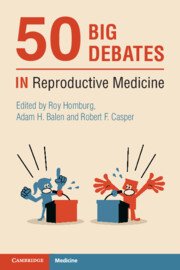Book contents
- 50 Big Debates in Reproductive Medicine
- Series page
- 50 Big Debates in Reproductive Medicine
- Copyright page
- Contents
- Contributors
- Foreword
- Introduction
- Section I Limits for IVF
- Section II IVF Add-ons
- Section III The Best Policy
- Section IV Embryology
- Section V Ethics and Statistics
- Section VI Male-factor Infertility
- 35A Sperm Counts Are Falling Worldwide
- 35B Sperm Counts Are Falling Worldwide
- 36A There Is Value in Examining Sperm DNA Fragmentation
- 36B There Is Value in Examining Sperm DNA Fragmentation
- 37A Testicular Sperm Should Be Considered for Repeated ICSI Failed Implantation Cases in Men with High Sperm DNA Damage
- 37B Testicular Sperm Should Be Considered for Repeated ICSI Failed Implantation Cases in Men with High DNA Damage
- Section VII Genetics
- Section VIII Ovarian Stimulation
- Section IX Hormones and the Environment
- Index
- References
37A - Testicular Sperm Should Be Considered for Repeated ICSI Failed Implantation Cases in Men with High Sperm DNA Damage
For
from Section VI - Male-factor Infertility
Published online by Cambridge University Press: 25 November 2021
- 50 Big Debates in Reproductive Medicine
- Series page
- 50 Big Debates in Reproductive Medicine
- Copyright page
- Contents
- Contributors
- Foreword
- Introduction
- Section I Limits for IVF
- Section II IVF Add-ons
- Section III The Best Policy
- Section IV Embryology
- Section V Ethics and Statistics
- Section VI Male-factor Infertility
- 35A Sperm Counts Are Falling Worldwide
- 35B Sperm Counts Are Falling Worldwide
- 36A There Is Value in Examining Sperm DNA Fragmentation
- 36B There Is Value in Examining Sperm DNA Fragmentation
- 37A Testicular Sperm Should Be Considered for Repeated ICSI Failed Implantation Cases in Men with High Sperm DNA Damage
- 37B Testicular Sperm Should Be Considered for Repeated ICSI Failed Implantation Cases in Men with High DNA Damage
- Section VII Genetics
- Section VIII Ovarian Stimulation
- Section IX Hormones and the Environment
- Index
- References
Summary
For couples with repeated ICSI failure, there is currently no further treatment option for men wishing to father their own biological child. Men with high damage in their ejaculated sperm have less DNA damage in their testicular and epididymal sperm. Live birth rates are higher in Testi-ICSI than conventional ICSI for couples with repeated ICSI failure, and PICSI and IMSI are less successful than Testi-ISCI. ICSI with testicular sperm should NOT be offered to men with untested sperm DNA as evidence of benefit is ambivalent. In order to ensure that testicular sperm are indeed of better genomic quality than their ejaculate counterparts, diagnostic testing is required to avoid invasive biopsy unless indicated. Prior to Testi-ICSI, men should have clinical histories and examinations and all other causes of sperm DNA damage should be treated. A major confounding factor in assessing the benefits of Testi-ICSI with conventional ICSI is female age.
- Type
- Chapter
- Information
- 50 Big Debates in Reproductive Medicine , pp. 189 - 190Publisher: Cambridge University PressPrint publication year: 2021

